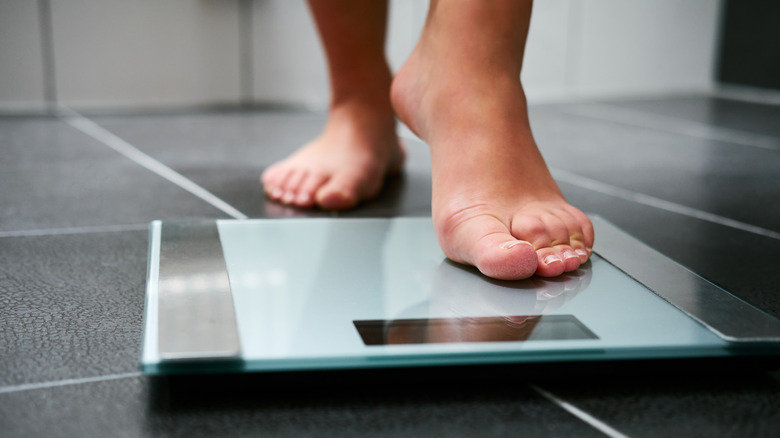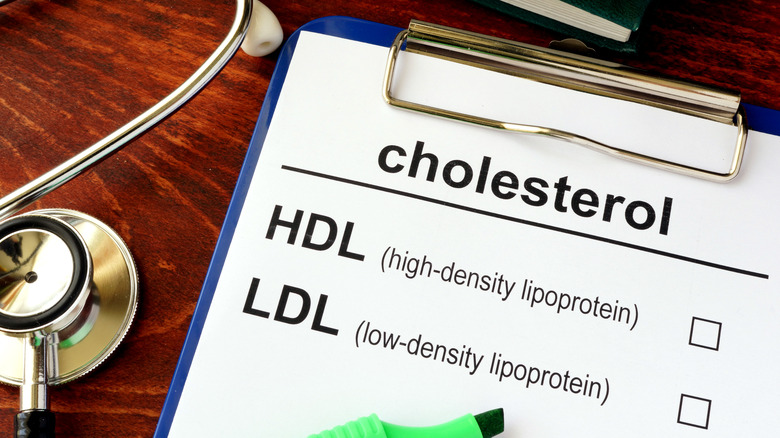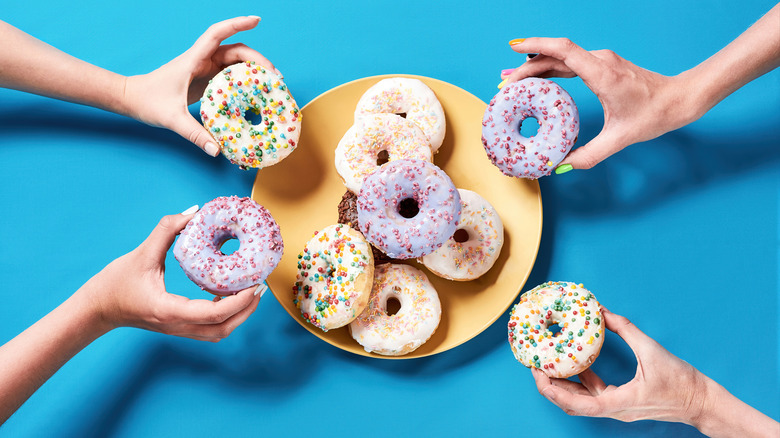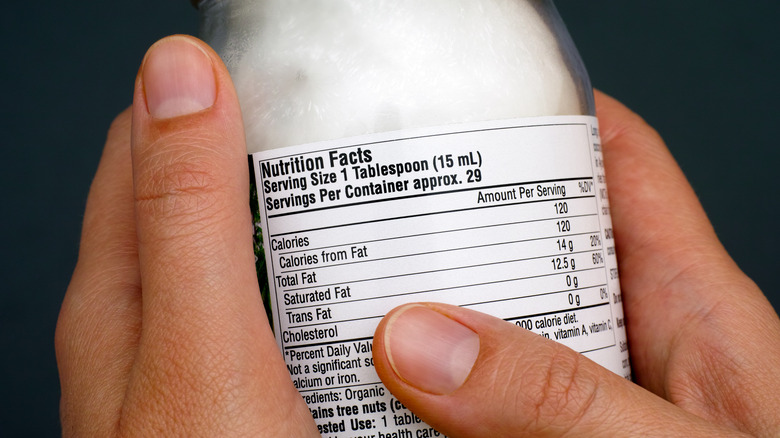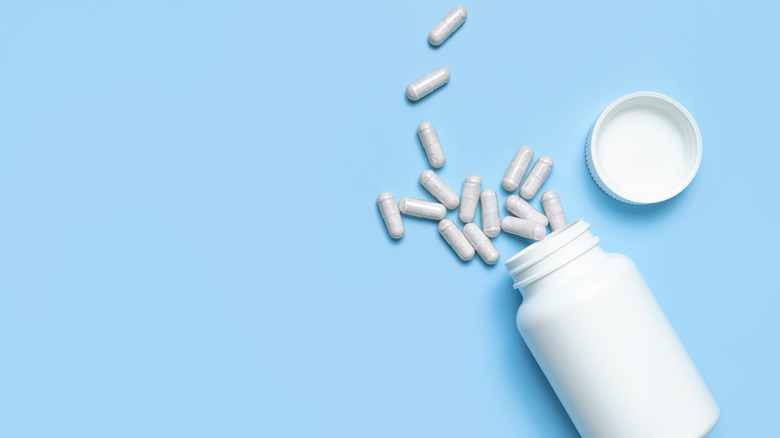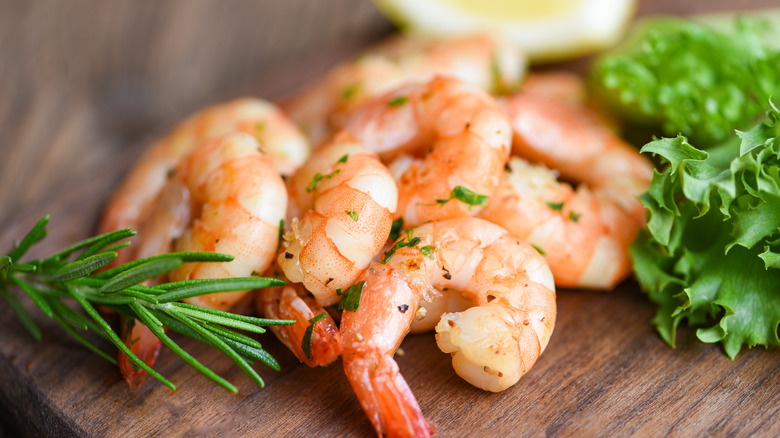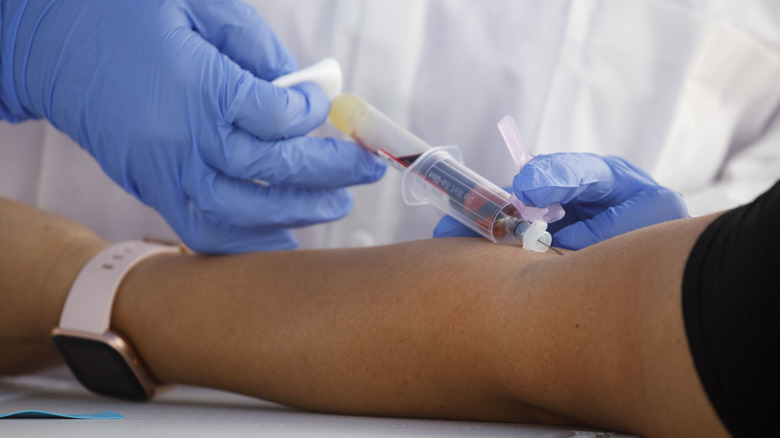Myths You Should Stop Believing About Cholesterol
While most of us know that having high cholesterol is bad for you, according to a Cleveland Clinic survey of people living in the United States, few can describe what cholesterol is or how it relates to our heart health. Dr. Robert Greenfield, a cardiologist at MemorialCare Heart & Vascular Institute, puts it this way (via Medical News Today): "Cholesterol isn't bad. It's an innocent bystander that is being mishandled in our modern lifestyle today." For such a common and necessary substance in the body, myths and misunderstandings about cholesterol abound.
So what is it? Cholesterol is a waxy type of fat. Your liver produces it and it also comes from animal sources that you eat, says the American Heart Association. Your body needs cholesterol to function properly, but not all of it is equal. "[Cholesterol is a] substance that helps your body make cell membranes, many hormones, and vitamin D," explains Dr. Seth Shay Martin, director of the advanced lipid disorders program at Johns Hopkins Medicine (via Eat This, Not That!). The good stuff, called HDL or high-density lipoprotein, cleans out excess cholesterol in your bloodstream. But the bad stuff known as LDL, or low-density lipoprotein, builds up in your arteries and can potentially cause blockages that lead to a heart attack or a stroke.
Myth: Eggs are especially bad for your cholesterol
With all the negative press about eggs over the years, it's easy to think that every egg you eat is bad for you. But it's simply not true.
You actually need cholesterol for a happy, functioning body. Many of us assume that if we have a cholesterol problem, then it must come from the foods that we eat. But go ahead and eat an egg at breakfast, says the Mayo Clinic. It might even have a protective benefit to the heart, according to a Chinese study. Unless you have a chronic illness like diabetes, research shows that foods high in dietary cholesterol, such as eggs, actually have a trivial effect on blood cholesterol levels in general (per Healthline).
"The amount of cholesterol that you eat doesn't actually impact your own cholesterol very much," says Dr. Kate Kirley, director of chronic disease prevention at the American Medical Association. "And that's because your body is making cholesterol. It makes cholesterol no matter what... What you eat matters, but it has less impact on cholesterol levels than a lot of people might realize."
Myth: You have to be overweight to have high cholesterol
It's true that losing weight — even just 10 pounds — can help reduce your low-density lipoproteins (LDL) and triglyceride levels (a type of fat in your blood), confirms Johns Hopkins Medicine. Many times, a change in diet and lifestyle is all that is needed. But improving your lipid numbers can be a more complex issue for some people. In fact, you may be surprised to learn that weight is sometimes not a factor at all. "Even if you have a healthy weight, your cholesterol can be abnormal," reveals cardiologist Dr. Edo Paz at K Health (via Medical News Today).
According to Yale Medicine, changing diet and exercising more will help some people. But if you're born with a genetic mutation that causes high LDL cholesterol, then lifestyle changes alone won't be enough. That inherited disorder is called familial hypercholesterolemia (FH), and one in 200 U.S. adults have it (per the American Heart Association). Most people don't show any visible signs of FH. "Everyone's cholesterol levels tend to rise with age. But those with FH have LDL levels that start high and go even higher over time."
Myth: There's only one universal healthy cholesterol level for everyone
When you get your blood test results from an annual physical, it'll often include a lipid panel, also called a complete cholesterol test (via the Mayo Clinic). Your doctor will let you know if your blood results are within the normal reference ranges.
But according to the American Heart Association, your overall risk for heart disease is more important than what those standard ranges indicate. "Your target level of cholesterol is based on whether you have a history of certain diseases — like heart attack and stroke — and your risk of developing these issues, which is based on things like age and whether you have high blood pressure," says Dr. Edo Paz, a cardiologist at K Health (via Medical News Today).
So if you're healthy, you should aim for LDL cholesterol levels below 100 mg/dL, confirms the Centers for Disease Control and Prevention (CDC). But other individuals who may have heart or vascular diseases, or diabetes, should aim for even lower targets of less than 70 mg/dL, as Dr. Paz explains (per Medical News Today). Reference ranges are great, but like most things in life, there is no "one size fits all."
Myth: Eating high-cholesterol foods won't affect your cholesterol numbers
Just because some formerly maligned high-cholesterol items like eggs or shrimp have gotten a new lease on life in the medical community (per WebMD) doesn't mean you should be chowing down on high-cholesterol foods with abandon.
According to the CDC, it's not so much the cholesterol in a food that makes it bad for your heart, but the saturated fat that the item contains. Eggs and shrimp are low in saturated fat, but the same can't be said for most other high-cholesterol foods like certain cuts of red meat, full-fat dairy, fried foods, and baked goods made with butter or shortening (via the Cleveland Clinic).
"Most people don't need to cut down on the cholesterol that's found in foods — so you can still enjoy eggs and shellfish," explains Heart UK, stressing that reducing one's intake of foods that are rich in saturated fats is a "much more important" course of action. "That's because saturated fats affect how the liver handles cholesterol."
Myth: If you have high cholesterol, there's nothing you can do
It can be shocking to find out you have high cholesterol. For most people, you won't see any outward warning signs, explains Cedars-Sinai. However, the good news is improving your numbers is within your grasp — and it's common sense stuff. Diet, weight, exercise, smoking, and high blood pressure are risk factors you can control. And if changing your lifestyle isn't enough, then cholesterol-lowering medications can give your system a needed boost.
"If you're a cholesterol glutton, where you're eating junk all the time and you go on a very good, low-fat diet and start exercising, you can lower your cholesterol levels by 30%," says Dr. Steven Jacoby, a cardiologist with Yale Medicine. Medications can also greatly help, Jacoby adds. "The lowest dose of the weakest statin can lower cholesterol levels by 20%."
Though what you eat isn't the primary factor for high cholesterol, changing diet and lifestyle patterns can still make a significant improvement to your numbers. Cut out most saturated fat, sugar, and white flour from your meals while adding more fiber and nuts to your plate, advises the Cleveland Clinic. Lose five or 10 pounds and get your body moving with regular exercise. And the CDC reminds us that if you smoke — quit! A cigarette habit can lead to narrowed arteries and a heart attack.
Myth: If you take statins, you can eat anything
Can you just take one of these magic, cholesterol-lowering statin pills daily and not change a thing in your diet? Many people think that's the deal, but it's not.
Worldwide, more than 200 million people take statins to dramatically lower the low-density lipoproteins that may be clogging their arteries, per Johns Hopkins Medicine. Those who get the most benefit from these drugs, according to an analysis in the journal The Lancet, tend to have the inherited type of high-cholesterol condition. "The statin drugs markedly reduce LDL and triglycerides, while increasing levels of HDL or 'good' cholesterol," says Dr. Robert F. DeBusk, professor emeritus of cardiovascular medicine at Stanford University (via Healthline).
While you will get some benefits from the drug, the hard truth is if you continue to eat foods high in saturated fat, you will make it much harder for the statin to do its job. "We believe that the goal of statin treatment... should be to allow patients to decrease risks that cannot be decreased without medication, not to empower them to put butter on their steaks," says Dr. Takehiro Sugiyama, who was the lead author in a 2014 statin study.
Myth: You'll feel bad if you have high cholesterol
Unlike many types of conditions, high cholesterol is usually one of the "silent" ones. It rarely produces any symptoms at all. "You might exercise, eat a healthy diet, do everything right, and still have elevated cholesterol levels," Dr. Demilade Adedinsewo, a Mayo Clinic cardiologist based in Jacksonville, Florida, told Prevention.
Sometimes, high blood pressure can be a sign of high cholesterol (via Verywell Health). In severe cases of the condition, you may get fatty lumps called xanthomas on your body (per WebMD). But for the majority of people, the first time they learn they have a cholesterol problem is when they see a doctor and get blood drawn for a lipid panel test — or in a worst-case scenario, when they suffer a heart attack or stroke.
"For most adults, it's good to have [your cholesterol levels] checked at least once so you have a general idea about where your levels may be and what your risk may be," says Dr. Kate Kirley, director of chronic disease prevention at the American Medical Association. "And then for people who have risk factors like high blood pressure or older age, we may start checking every few years or so."
Myth: Children don't need to worry about cholesterol
Those with high cholesterol typically get the diagnosis during their 40s and 50s. However, a small but significant number of younger people aged 6 to 19 also have high cholesterol. according to Prevention. For school-aged kids, heredity, diet, and obesity are the three main causes of it (via the Cleveland Clinic). It can also run in families. But the bottom line is that early diagnosis and treatment are critical so the condition doesn't progress to heart disease.
"Youth obesity is a leading cause of high cholesterol in children," says Dr. Nivedita Patni, a pediatric endocrinologist at Children's Health and an assistant professor at UT Southwestern Medical Center in Dallas, Texas. "More than 43% of children with obesity have high cholesterol compared to less than 14% of kids who are not obese."
"If we focus on these issues during the teenage years rather than once a person is an adult, we may be able to change the natural history of what a person's health will look like by middle age," says Dr. Francine Erenberg, a pediatric cardiologist at the Cleveland Clinic (via Everyday Health). "Because by then, it's often too late to change outcomes." Fortunately for the majority of pediatric cases with high cholesterol, according to Stanford Children's Health, lifestyle changes alone will be sufficient.
Myth: If a food product's packaging says no cholesterol, it's healthy for your heart
You might reach for a "cholesterol-free" jar of something on your next grocery run because the claims on the front of the package make it seem healthy (via Healthline). Truth is, you'd be better off studying the Nutrition Facts label on the back. That's where you'll find the real information.
When it comes to cholesterol, take a close look at the saturated fat content. Many foods contain a ton of saturated fat, warns the Cleveland Clinic, and that type of fat is far worse for your heart and arteries than foods with some cholesterol or are labeled "cholesterol-free."
Unfortunately, the Food and Drug Administration doesn't pay close attention to front-of-package (FOP) labeling, according to the Harvard T.H. Chan School of Public Health. "Food manufacturers can choose to display FOP symbols or graphics that highlight nutritional aspects of the product if they are favorable to health... but may leave out less favorable information such as being high in sodium or saturated fat." While the designs of the labels on many products may suggest that they're healthy options, the reality may be a bit disappointing.
Myth: You have to take prescription medicine to lower cholesterol
Aside from having a genetic predisposition to very high levels of cholesterol, reducing it for most people is really no mystery. Eat a heart-healthy diet, combine it with regular exercise, and quit smoking, says Healthline. And if those steps don't bring down the bad numbers far enough, your doctor can prescribe medications.
Statins and other drugs, as well as the newer monoclonal antibodies called PCSK9 inhibitors (via Harvard Health), all work great work in driving down bad cholesterol numbers. But even if you end up on the medication route, you still need to do all the other lifestyle things to make these treatments work most effectively.
"Even if you could get your LDL cholesterol down to low levels with a statin, there are many others, these lipoproteins, out there in your blood that contribute to heart disease that are not necessarily lowered by the statin, and the diet plays a really important role in that," explains Dr. Ian Neeland, an interventional cardiologist at University Hospitals. "So, you're not off the hook eating the cheeseburgers and fried chicken just yet."
Myth: Eating any high-cholesterol foods causes high cholesterol
It may seem counterintuitive, but eating shellfish and other high-cholesterol foods is not causing your high cholesterol.
The real problem is saturated fat, per CNN. That's what is especially bad for heart health and can add to a cholesterol problem. While grilled shrimp — which is high in cholesterol — is yummy, healthy, and a great protein source, the way they're cooked and how they're served are crucial, according to WebMD. Are you soaking those tasty shrimp in butter or dousing them in a creamy garlic sauce? These are important factors that can turn an otherwise healthful meal into an artery-clogging mess.
"When we eat cholesterol, it's broken down in the gut; it's not absorbed as a whole cholesterol molecule," Dr. Peter Schulman, a cardiologist and professor of medicine at the University of Connecticut, told Health. "Saturated fats, meanwhile, are broken into short chains of fatty acids that can become linked in the body — and that's what has been shown to increase cholesterol levels significantly."
Myth: Total cholesterol is the only number that's important
Nobody wants the plumbing in their home clogged up, and the same goes for blood vessels, too. When your doctor requests a lipid profile during an annual physical, it's a way to see what's going on in your own body's "plumbing." Although a total cholesterol number lower than 200 mg/dL is ideal, if yours turns out to be higher — don't panic! Your total cholesterol number is just one piece of the puzzle in your cholesterol health.
What is total cholesterol? It simply adds together the "good" high-density lipoproteins (HDL) that absorb cholesterol, with the "bad" low-density lipoproteins (LDL) that cling to blood vessels, plus 20% of your triglyceride level (fat in the blood tied to diet and lifestyle), explains the American Heart Association. So total cholesterol is not an especially useful number just on its own.
As Dr. Robert Greenfield, a cardiologist and internist at MemorialCare Heart & Vascular Institute, told Everyday Health, "It's important to know each component of the total cholesterol, as just knowing the total cholesterol — especially if it's high — doesn't tell you why it's high, which is so important in planning a treatment strategy."
Myth: Cholesterol levels can never be too low
While the overwhelming majority of people with abnormal cholesterol levels have high cholesterol, it's also possible to have concerningly low numbers. Some studies have shown that this condition (called hypolipidemia) may be a contributor to severe depression, anxiety, and other mental health conditions (via Psychology Today). "While cardiologists have been racing to lower serum cholesterol more and more... the importance of cholesterol in the brain relative to cholesterol and heart health has been mostly ignored," says Dr. Emily Deans, a board-certified adult psychiatrist practicing in Massachusetts.
Very low cholesterol levels are described as a total cholesterol value of below 120 mg/dL or LDL "bad" cholesterol that's lower than 50 mg/dL, according to WebMD. In rare cases, hypolipidemia is caused by a genetic disorder. More commonly, it's a symptom of another problem, such as hyperthyroidism, cancer, or anemia (per Merck), or even an overly aggressive dosage of statin medication (via Healthline).
If you or someone you know is struggling with mental health, please contact the Crisis Text Line by texting HOME to 741741, call the National Alliance on Mental Illness helpline at 1-800-950-NAMI (6264), or visit the National Institute of Mental Health website.
Myth: Men should be more worried about cholesterol than women
Although men are statistically at risk earlier than women for heart attacks and strokes from high cholesterol (via WebMD), the field is evened out once women go through menopause, says Harvard Health. When menopause hits, women become as vulnerable to heart disease as men, and their total cholesterol values rise higher, too.
During their childbearing years, women produce higher levels of high-density lipoproteins or HDL because of their body's abundance of the hormone estrogen. This "good" type of cholesterol absorbs and cleans bad cholesterol from the bloodstream (via Johns Hopkins Medicine) and also lowers the risk of heart disease for women through middle age.
Dr. Robert Greenfield, a cardiologist and internist at MemorialCare Heart & Vascular Institute confirms, "Women, after losing the protective effects of estrogens, begin to accelerate their risk of heart disease and develop the same risk as men" (via Medical News Today).



